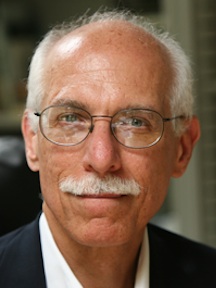By Kelly Coughlin
George Greenia, professor of Hispanic Studies at the College of William & Mary, received Phi Beta Kappa’s President’s Award at the 44th Triennial Council held this fall in Denver, Colorado.
Fred Cate, Distinguished Professor and C. Ben Dutton Professor of Law at Indiana University, also was recognized with the President’s Award at the council. Cate is director of the Indiana University Center for Law, Ethics and Applied Research in Health Information and the Center for Information Privacy and Security. In summer 2015, he became the university’s vice president for research.
For ten years Greenia has served as director of the program in Medieval and Renaissance Studies at the College of William & Mary, which includes leading undergraduates through the routes of the Camino de Santiago in northern Spain. In 2007 Greenia, a prolific author and editor of scholarly books and journals, was named Editor of the Year by the Council of Editors of Learned Journals and was also knighted by order of King Juan Carlos I of Spain and granted the Encomienda de la Orden de Isabel la Católica.
The President’s Award, which is commemorated by presentation of the Judith F. Krug Medal, was created in 2009 by the Phi Beta Kappa Senate. It is given in recognition of truly outstanding and extraordinary service to Phi Beta Kappa as a national organization.
Greenia said that the President’s Award and Krug Medal “are enormous honors that would stagger any recipient, and they’re all the more thrilling considering this tribute comes from colleagues I’ve worked intimately with for the last six years.”
Judith Krug spent 40 years fighting censorship and was involved in multiple cases seen before the United States Supreme Court—always fighting to uphold the rights granted by the First Amendment. She was the founder of the American Library Association’s Banned Books Week, an event observed across the country from September 27 to October 3 each year.
Recognizing the gravity of Krug’s legacy, Greenia said “from high school I was more than the usual bookworm: I trained as a printer and bookbinder, so the tools of literacy and free inquiry were literally part of my livelihood.”
Over the course of his career, Greenia’s work has brought him closer to the causes Krug fought for. “I teach the social history of reading communities and help prepare undergraduates for internships at the Library of Congress,” Greenia said. “Perhaps fate has already let me participate in the causes Judith King defended with such courage.”
“During his time with Phi Beta Kappa [Greenia] has carried his enthusiasm for the Society’s purposes to the national stage,” said ΦBK President Kate Soule. In addition to remaining very active in the chapter at William & Mary, Greenia was elected to the ΦBK Senate in 2009 and served for six years on the Executive Committee. As befits a student of pilgrimages, he is constantly on the move, visiting a long list of campuses all over the country, some already sheltering chapters and some seeking them.
But that was not always the case. Greenia admits, “like many students in the Midwest—especially back in the mid-seventies—I had no idea what Phi Beta Kappa represented.” His school, Marquette University, had only recently been granted a chapter.
Due to a complete lack of personal funds, Greenia said, “I was selling my blood plasma twice a week to feed myself while I went to college.” So, he opted to discard his invitation to join Phi Beta Kappa.
“It was one of my closest professors who insisted that I accept and simply paid my induction fee for me,” Greenia recalled. That gesture “marked my understanding of what ΦBK stands for from that moment on,” he said.
In her introduction to this year’s President’s Awards, President Soule said, “Two of the stars on the Phi Beta Kappa key stand for literature and morality. The third is for George – friendship.”
From the time his professor paid his induction fee to the present, Greenia has associated Phi Beta Kappa with friendship.
“There are friendships that simply comfort and that everyone treasures for their healing power and plain humanity,” said Greenia. “Those alliances may change over time when you look for more mature companions or just pals to share a specific experience with, like a sport or a pastime.”
“The friendships I have enjoyed among fellow ΦBK key holders have all that and more, since they challenged me to think more clearly and hold myself to a higher moral standard.”
Restating the meaning of the trio of stars that marks the Phi Beta Kappa key, Greenia considers his own interpretation of their meaning:
“The triad is literature, morality, and friendship, which many new members hear as an unlikely cluster of guideposts. The challenge is to finally understand them as mutually reinforcing, so you commit yourself to the sort of friendship that’s the worthy target of literature and which enhances morality. That’s truly learning for all of life.”
Kelly Coughlin is a senior at the University at Buffalo majoring in Biological Sciences and minoring in English. UB is home to the Omicron of New York Chapter of Phi Beta Kappa.




